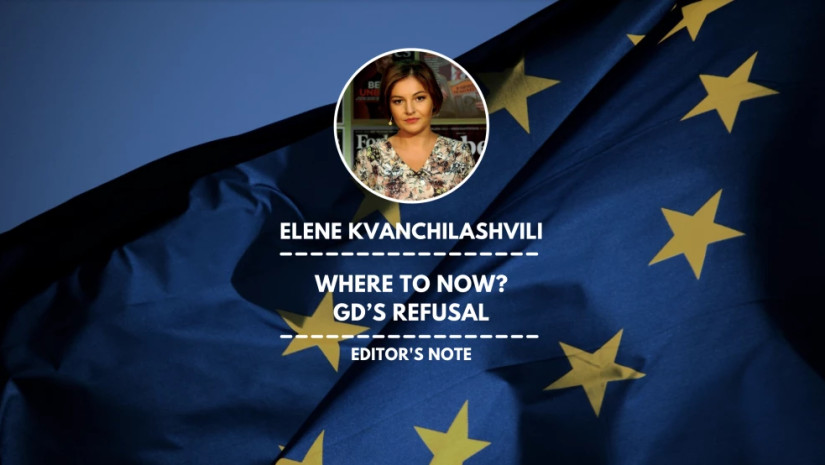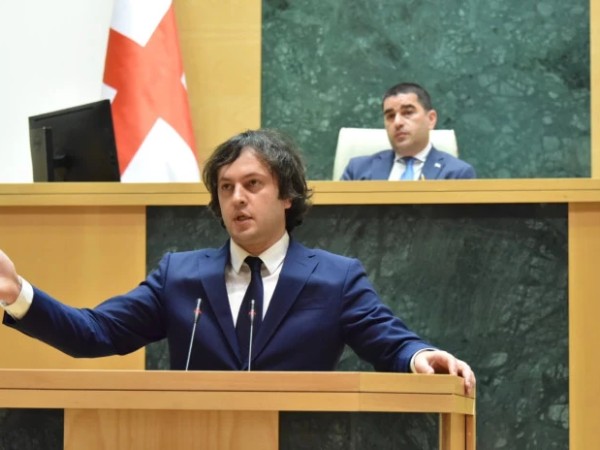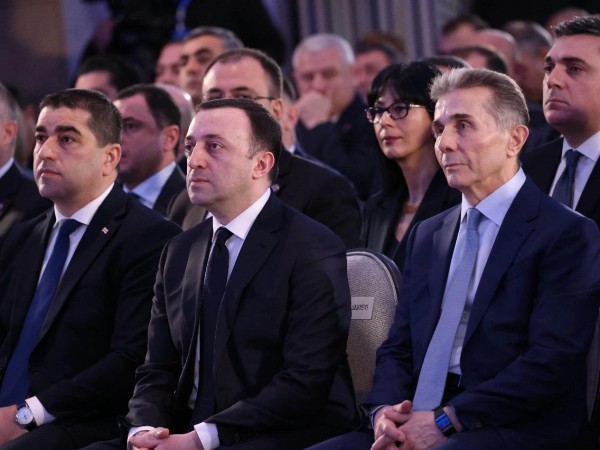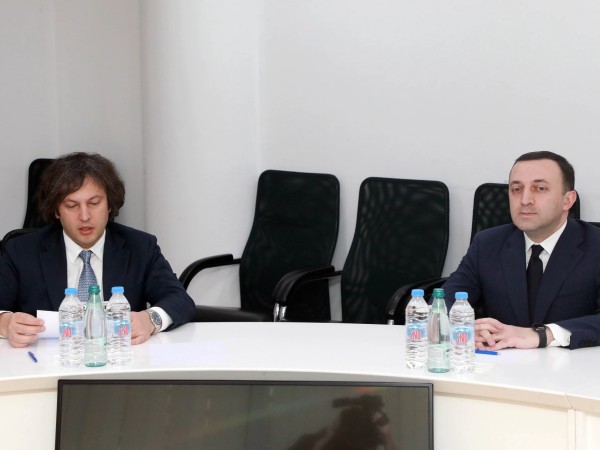Georgia refused EUR 75 million loan from the European Union, conditioned on the court reform and upholding EU-brokered April 19 deal. Such is the final decision and responsibility of the Georgian Dream and Prime Minister Irakli Gharibashvili.
The Prime Minister’s words come a day after the Ruling Party Chair Irakli Kobakhidze announced the EU’s macro-financial assistance “lost its economic significance” since the economy saw a far bigger growth than initially expected, bringing an additional GEL 1 billion to the budget.
Later, PM Gharibashvili reiterated the same reason, adding: “This issue gained a huge political significance. We have decided to refrain from the second tranche of the EU macro-financial assistance” and “we are very thankful to the EU for all of the help, including during the pandemic management, and in general, for everything they have done for us.”
EU’s RESPONSE
EU’s RESPONSE
The European Union said while it respects the Georgian Government’s decision not to ask it the disbursement of EUR 75 loan, “Georgia failed to sufficiently address the condition for this macro-financial assistance and notably, to increase independence, accountability and the quality of the judicial system.”
The EU warned earlier it would withhold the aid should the Georgian Government fail the court reform condition. On his latest visit to Georgia, Charles Michel -European Council President - who led political crisis mediation efforts in Georgia, made it very clear that the EU might cut EUR 75 million loan if Georgian authorities fail the court reform and refuse to commit to the April 19 EU-brokered deal.
PM Gharibashvili’s announcement that Georgia has decided to refuse EUR 75 million loan from the European Union came a day before the deadline for the EU’s decision to stop the assistance to Georgia if it failed the reform condition.
US RESPONSE
US Ambassador to Georgia commented on the Georgian government’s decision not to take EUR 75 million assistance. Kelly Degnan said it was a surprise amid the high unemployment and poverty rate in Georgia.
“We were a little surprised that the Government of Georgia’s statement that Georgia doesn’t need EUR 75 million in assistance, despite the high unemployment and poverty rate and of course the impact of COVID. I’m sure Washington will take note of that as well. What my understanding is that this assistance was tied to important judicial reforms. And that was clear last year when the package was discussed between the European Union and the Georgian government. So again, these are important reforms that need to be made and we hope that that will continue to be the case. Of course, there are difficult reforms, and some good reforms have been made, which is very encouraging and, again, it’s now important that whether it’s tied to EUR 75 million or not that these reforms are made.
The United States Congress is watching what happens here, and we always coordinate with the Georgian government as to what kind of support they need and want. And so, I’m sure they will take note of the government’s statement that they don’t need EUR 75 million in assistance,” Kelly Degnan said.
MESSAGE FROM MOSCOW
Russian Foreign Minister Sergey Lavrov said Moscow is ready at any moment to have normal neighborly relations with Georgia if it wants to, provided Tbilisi doesn’t “play the Russian card to save its Western patronage.”
In his remarks with the students at the Moscow State Institute of International Relations (MGIMO), Lavrov said Russia had considered granting Georgia visa-free travel but “decided to hold back the possibility after not receiving any kind of apology” for the anti-occupation unrests of June 20, 2019, in Tbilisi.
VOICE OF INT” L COMMUNITY
MEPs Viola von Cramon (The Greens/EFA, Germany) and MEP Andrius Kubilius (EPP, Lithuania) slammed the GD government’s decision to refuse the EUR 75 million loan. MEP von Cramon argued that Georgia had not fulfilled the conditions anyway. “You can’t decline what you were not eligible for,” she tweeted.
The EPP MEPs are “traditionally in solidarity” with the UNM and make “biased statements” without looking into the issue first, PM Garibashvili commented.
“A Member of the European Parliament is not my boss,” PM Gharibashvili stated, stressing that “Our bosses are the Georgian people” and adding: “if MEPs are actually interested in understanding the situation and the substance of the issue, they should look into it instead of making shallow statements.”
Claiming that Georgia’s judiciary is “well ahead of the courts of the European Union Member States,” PM Gharibashvili reiterated that the Georgian government refused the conditional loan to avoid the “political insinuations and speculations.”
Later, MEP von Cramon responded to the Georgian PM remarks ironically - “Very tempting career perspective.”
FACTOR OF OPPOSITION
PM Gharibashvili accused the opposition of pushing the EU towards using the conditionality mechanism, noting that “our opponents have moved to the regime of sabotage to somehow… hinder our course towards the West.”
“It is a tragedy that former President Saakashvili is guiding EU institutions — as you know he is member of the EU people’s party, EPP group — and spares no effort to bring sanctions and obstructions against us,” the Prime Minister noted.
Today – 2 September 2021 - the UNM opposition party signed the April 19, EU-mediated agreement proposed by European Council President Charles Michel after months of refusal to join it.
EU Delegation to Georgia posted photos of the UNM leaders signing the Agreement with the caption: “Signature of the Agreement "A way forward for Georgia" of 19 April by the Chair of UNM Nika Melia, on behalf of the UNM party, by faction leader Khatia Dekanoidze and by individual UNM MPs”.
US Ambassador to Georgia Kelly Degnan also welcomed the largest opposition United National Movement (UNM) party’s decision to sign the EU-mediated agreement and stated that ‘it is a good sign for strengthening Georgia’s path forward.’
The UNM’s decision follows the GD’s withdrawal from the agreement in late July. The Ruling Party then claimed the decision was based on the largest opposition party’s refusal to sign the document.
The GD stated that UNM’s signature on the document ‘makes no sense as the agreement does not exist.’
PRESIDENT OF GEORGIA'S COMMENT
"Until the 2-digit economic growth affects the well-being of the population, the logic of refusing assistance is unclear," Georgian President Salome Zourabichvili declared today – 2 September 2021.
"The announced refusal to accept an EU loan is a rather incomprehensible step for a large part of the population and me personally. An economic argument about the need to reduce debt fails. No matter what the growth of our economy, even a double-digit number, still does not cancel the social and economic damage that the COVID-19 has caused to our population. The damage would have been reduced by the loan of the mentioned EUR 75 million. It is unclear what causes international debt reduction to become a priority over the crisis of the citizens today. Until the 2-digit economic growth affects the well-being of the population, the logic of refusing assistance is unclear," the President of Georgia said.
Zourabichvili believes it sounds paradoxical when the government refuses European aid and on the other hand, the government highlights the importance of Rikoti Road considering that this road is largely implemented through loans from Europe.
"The economic consequences of this decision are not only reflected in taking the aid. The main thing here is the reputation of our country and the credibility of the Government's word," - said the President, adding she will stand by the European choice of the country and will not allow anyone to change this choice.
VOICE OF BUSINESS COMMUNITY
“EU might choose to distance itself from Georgia. This is the real threat that we are facing now” – told BM.GE Sandro Tchumburidze, Head of the European-Georgian Business Council (EUGBC). Tchumburidze believes, the Government of Georgia should pay more attention to its statements when it concerns the EU.
“This issue is far beyond the one-credit tranche. This is a whole 30-year attempt for our country to come closer to the EU. Every program on financial assistance is part of the general cooperation with the EU and I would hope neither the government nor the citizens of this country forget this context” – Tchumburidze told BM.GE.
European Business Association (EBA) said it is high time the Government of Georgia started cutting the tax burden for businesses since the revenues from business to the state budget are higher than expected and Georgia does not need the EU loan. “This way the government could ensure at least some certainty for the business community to increase investment and contribute to the higher employment”, John Braeckweldt, EBA Board Chair told BM.GE.
Justice Reform is crucial for improving Georgia’s business climate and drawing FDI to the country, EBA believes. “It is of utmost importance to listen to international partners very closely and to analyze their comments since they do not represent only the governments of those countries, but also their businesses and investors” – EBA Board Chair stressed.
ABOUT THE LOAN
The Council of the European Union adopted a decision to provide up to EUR 3 billion of macro-financial assistance to ten enlargement and neighborhood partners on May 20. It included EUR 150 Million to Georgia, to help the Government of Georgia cope with the economic fallout of the COVID-19 pandemic.
It was decided that the financial assistance would be provided in the form of loans on “highly favorable” terms. It would then help Georgia cover its immediate financing needs which had increased following the COVID-19 outbreak.
The first disbursement of EUR 75 million was made in November 2020. The second disbursement was due on 30 September 2021, which Georgia will no longer get.
WHERE TO NOW?
Just to put things into perspective, the Government of Georgia refused the financial assistance that could have improved for example: access to hospital beds for COVID-patients; a number of family doctors for more sustainable care; import of bigger volumes of oxygen; import of needed medicine; the communication campaign on vaccination; financial encouragement of doctors and nurses working in toughest conditions 24/7; the starting point of the winter tourism in Georgia.
All of these steps would rule out the need for any type of lockdown. By refusing the EU loan, among many other things, the GD indicated that the state budget has enough funds to ensure all the immediate financial needs for managing the COVID-19 and took the responsibility to rule out any lockdown in the wake of elections and increased mobility. This is something that both citizens and businesses should keep the government accountable for.
Now, the two main – yet unanswered questions that BM.GE has for today concern the pending new IMF program and the role of Vazil Hudak, former EIB Vice-President that the PM Gharibashvili himself appointed as a personal advisor on drawing FDI and International Funds to Georgia.
PM Gharibashvili appointed Vazil Hudak in May 2021. The only practical goal that has been identified in the first briefing is for Georgia to become part of the 50 billion euro initiative of Europe to support the SME sector globally.
"It is aimed as an endeavor for greater resilience – Vazil Hudak, an EU envoy for SMEs, explained at a briefing - We have to operate in a difficult period together. It is true for Europe and globally. It is due to COVID.
However, I believe that difficult times are opportunities as well. We have an opportunity now to grow and develop in many different directions, create better quality in various areas, attract support from the USA, EU, and other countries. We know how to recover the economy through investments, more economic development, and advancement. I believe that this is the future of Georgia as well in the EU".
What the former EIB Vice-President has to say about the current decision of the Government of Georgia to refuse the EU loan is yet to be seen.
What we also do not know so far is the IMF’s assessment of the PM’s statement that Georgia does not need any further financial assistance, including the support to advance reforms. This statement raises questions on the need for another IMF-assisted Program for Georgia, which has been completed in July 2021. Back then the IMF stood ready to grant Georgia such a program if the Government had requested it.
“I will say there are a lot of policy areas where we see the broad common views with our counterparts in the government and the National Bank of Georgia. The Minister of Finance said very clearly that they would like another program. We stand ready to discuss the new program” – James John, Area Mission Chief of the International Monetary Fund (IMF) told BM.GE following the successful completion of Article 4 consultations.
In the same interview in July 2021, the Area Mission Chief of the IMF said:
“We will leave it to the EU whether its conditions to financial support have been met including with respect to judiciary reform. But maybe to step back, having a transparent, efficient, and impartial judicial system is important to the business environment for attracting investment and for strong private sector-led growth. And other development partners, counterparts we spoke with during the mission, and international assessments highlight the importance of judicial reform. We encourage the government to make the progress in this area to strengthen the business environment. So I think maybe that is the key point to take away that having an effective impartial and transparent judiciary is very important for the business environment. So we have encouraged progress in this area”.
The IMF resident office in Tbilisi declined to comment on GD’s decision to refuse the EU loan.















